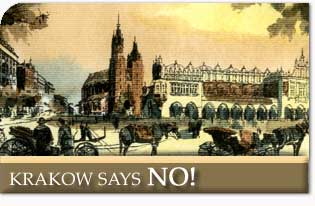The city of Krakow would seem to be an unlikely place for a heated debate over homosexual “rights” and same-sex “marriage.” Poland’s cultural capital is situated in a conservative region in this overwhelmingly Catholic country.
The city’s homosexual population is minute and insignificant. Indeed the issue has been largely ignored by Polish media. Resistance to the idea of same-sex “marriage” is strong and there is a tendency to be complacent in the belief that such an aberration would never enter the country.
This climate, however, has recently changed. With Poland’s May 1 entry into the European Union, many Poles are feeling the pressure to follow the example of other member nations who have approved same-sex unions and other such partnership benefits.
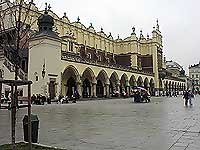
A March is Announced
This was further aggravated when a small group of homosexual activists in Krakow announced their intention to stage a protest march of “tolerance” on the same day as the procession of St. Stanislaus, the city’s patron and its largest religious event counting on the presence of cardinals, bishops, local clergy, city officials and multitudes of the faithful. The march was to end with a festival that included art, music and films with “gay, lesbian, bisexual and transgendered themes.”
City leaders immediately reacted to what they did not hesitate to call a “provocation.” It was only with difficulty that the march was moved two days earlier to May 8. With this, homosexual activists hoped to defuse protests and parade unopposed.
It was into this charged atmosphere that I unwittingly stumbled when I arrived in Krakow in early May. Two months earlier, I had been invited to give a series of informative talks on the homosexual movement and introduce the American TFP’s book, Defending a Higher Law: Why We Must Resist Same-sex Marriage and the Homosexual Movement. The TFP-inspired Stowarzyszenie Kultury Chrzescijanskiej im. Ks. Piotra Skargi (Fr. Peter Skarga Association for Christian Culture) sponsored the tour.
At the time of the invitation, the talks were to speak about a future threat. Now the threat was real.
Perceiving the need to protest against this provocation, Fr. Peter Skarga Association for Christian Culture sent nearly 280,000 flyers to Krakow residents. Readers were urged to send protest postcards to the city’s mayor and the rector of the sponsoring Jagiellonian University.
The issue quickly came to the fore. Over 30,000 protest post cards flooded both the town hall and university offices.
A Whirlwind Tour
The Krakow debate made same-sex “marriage” and homosexual rights an issue all over Poland. The liberal tabloid Gazeta Wyborcz, took note of the debate with the headline: “Krakow Says No to Gays.”
The controversy in Krakow only served to spark interest in the scheduled talks. The one-week whirlwind tour took us to Warsaw, Sandomierz, Lublin and Torun.
A few days before the march, the Fr. Peter Skarga Association for Christian Culture organized a public lecture on homosexuality at the ornate general chamber in the historic Krakow City Hall. Noted Polish doctor and psychologist Wanda Poltawski spoke at length of her observations and treatment of homosexuality. I also spoke to those who filled the full city chamber to tell them they were not alone: a majority of Americans also oppose same-sex marriage.
At Warsaw’s Institute for Family Studies, I spoke to a vibrant auditorium of university students where we discussed at length about how to deal with media and cultural pressure to accept homosexuality within their own age group.
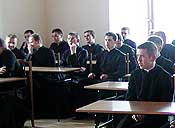
At the diocesan seminary in Sandomierz, it was heartening to see a room full of 145 seminarians, many in cassocks whose main concern were the pastoral aspects of the homosexual problem as well as the recent Church documents against same-sex unions.
Prof. Arkadiusz Robaczewski gathered members of his Instytut Edukacji Narodowej at Catholic University in Lublin where we discussed how the fall of communism made the left change its field of action. The new members of the proletariat of the left are the homosexual, feminist and ecological activists who see themselves as oppressed by Christian morality.
In Torun, north of Warsaw, we were part of a symposium at a Redemptorist school of journalism on the homosexual movement. A lively auditorium of young students discussed many of the myths used by the homosexual movement to promote their cause. These included the use of inflated numbers and the idea that homosexuality is innate or genetic.
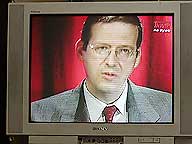
At nearby Radio Maryja, we visited this impressive state-of-the-art Catholic radio and television studio. Run by Fr. Tadeusz Rydzyk, the facility has millions of listeners in Poland and abroad. On both television and radio, I was invited to give an American perspective on the homosexual movement and field questions from listeners throughout Poland and even the United States.
Throughout the tour, Polish friends were heartened to hear there are wholesome reactions to homosexuality in America. They were encouraged to see they are not alone and how all must be united against the actions of the worldwide homosexual movement.
A Loud No
The march in Krakow took place as planned but not without protests and opposition.
The promised huge march of homosexual activists failed to materialize. Some 100-200 homosexual marchers were joined by about 500 sympathizers from a menagerie of leftist groups. Green Party supporters, feminists, anarchists and socialists made up the ranks.
Several hundred pro-family supporters spontaneously gathered to show their displeasure. The pro-homosexual march quickly broke up as the marchers saw how unwelcome their activism had become.
The headlines of the Gazeta Wyborcz the next day were quite expressive: “Krakow: Two Cities.” The homosexual issue had indeed polarized the city and forced all to take a stand. However, the small homosexual minority and their sympathizers could hardly be called a city. Rather I would say the debate united the city on this grave moral issue and the overwhelming majority said a loud “no” to those who would force homosexuality upon them.
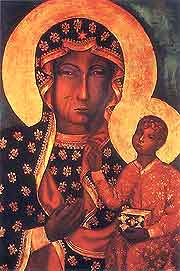
On Pilgrimage to Czestochowa
No visit to Poland is complete without a visit to the ancient icon of Our Lady in Czestochowa. There, this miraculous image reportedly painted by St. Luke, reigns as queen of Poland. She has seen invading Swedes, Russians and Austrians. She has stood firm in the face of Nazism and decades of communism. Long lines of pilgrims constantly move in and out as they have for centuries.
It is there at this sanctuary that you sense the heavenly alliance that allowed the Polish people to resist with such noble obstinacy so many attempts in history to destroy their nation.
Today Poland is pressured to accept a cultural revolution unlike any she has seen in the past and which threatens her Catholic identity. Pornography, homosexual activism and immoral fashions all enter with impunity. In face of this cultural revolution, heavenly recourse is greatly needed. As I looked upon the thousands of pilgrims who hasten to her sanctuary with their modern day problems, I could not help but united my prayers to theirs. In their needs, Our Lady of Czestochowa will not fail them. She will come to their aid.


